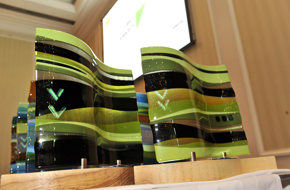Highlights
- A successful collaboration between 4 main partners and 10 preferred contractors has resulted in the development of 27 new homes, as part of the first phase of 121 homes, for social rent.
- First project of its kind in the UK to deal specifically with social housing.
- Work placement schemes have helped many trainees, with some entering full-time employment as a result.
- The project has elicited significant interest throughout the UK, and ideas from this project are being rolled out UK-wide.
- The project has predicted significant savings in fuel and energy for tenants.

Kingdom Housing was the lead partner in an affordable housing project (Housing Innovation Showcase) delivered in Dunfermline using modern methods of construction and renewable technologies. The project was a result of a collaboration between Kingdom Housing, the 4 main partners (Kingdom Housing, Campion Homes, Fife Council and Green Business Fife) and 10 preferred partner organisations.
As part of this partnership approach, preferred developers were selected to develop individual plots to showcase innovation in affordable housing through:
- design and construction of different house systems
- assessment of the sustainability (energy efficiency, carbon reduction, etc.) of a range of different house types
- a housing exhibition of sustainable products and services
- promotion of sustainable communities through:
- training and employability work placements
- innovative landscaping to highlight the benefits of greenspace
- involvement of local schools to increase awareness of sustainable design and future career choices
- development of community art work to enhance the external development.
Environmental benefits have been achieved through: the environmental characteristics of the construction systems used, reduced construction time, reduced transportation costs and reduced on-site waste. Based on a plot that has been designed to meet 2016 regulations, energy use is predicted to be 2386 kWh per year, which is about £262 in energy costs for one year.
The VIBES judges were extremely impressed with this project, and Kingdom Housing has demonstrated its commitment to successful collaborative working with a number of partnership organisations. While a similar project has taken place in Inverness, this was the first project in the UK to deal specifically with social housing.
It was obvious to the judges that a project such as this could only be run by different constructors working in collaboration. The projects required buy-in from all partners, and could not have been set up without collaboration from the partners. Additionally, savings (both economic and environmental) were made by all partners working together. The judges were impressed by the significant preparatory work undertaken before the project started and the clear objectives that were set.
Each partner in the project agreed to pay a partnership participation fee to demonstrate commitment and this funding was used to market the project and help fund the 3 week Innovation Showcase Exhibition, which was held in May 2012. Each partner also agreed to take on trainees from Carnegie College as part of the project. The total cost of the project was £3.5 million and part funding of £2.95 million was provided by the Scottish Government to provide the first phase of 27 social rented homes.
During the visit the judges were introduced to a number of representatives from Kingdom Housing Association, Campion Homes and Fife Council. The judges were pleased to note that the project partners were very enthusiastic about the work they have undertaken and their achievements, and have a high level of commitment to the project.
The judges noted that the project was well-marketed and involved the local community, in particular local primary schools, the 3 colleges in Fife and Edinburgh Napier University. Work placement schemes have helped many individuals, with some entering full-time employment as a result. The project has elicited significant interest throughout the UK, and ideas from this project are being rolled out UK-wide.
As the project was to showcase sustainable options and products, it is predicted to result in significant savings in fuel and energy for the tenants. Promoting these measures should continue to bring about savings in future developments.
Looking at the criteria relating to this collaboration category, it was difficult for the judges to find weaknesses relating to the overall project. Kingdom Housing is clearly committed to collaborative working, and the VIBES judges look forward to seeing the longer-term measurements of energy consumption, which is a two-year project being carried out in conjunction with Napier University.